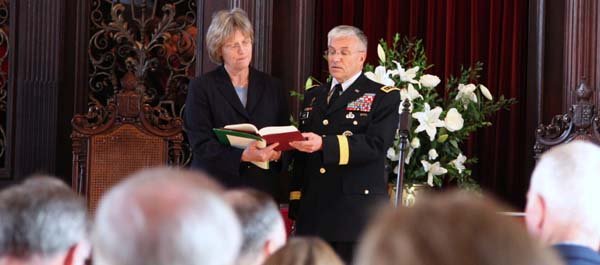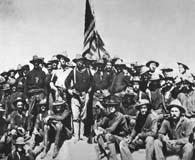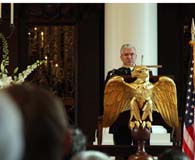Harvard Remembers Its Distinguished Military Veterans – Without a Fight!

Hard as it may be to believe, Harvard has certainly done its duty to the country, since the University has more winners of the award [Distinguished Service Medal] than any other American college or university except, of course, for the service academies.
Harvard and America’s military are not exactly thought of as a warm couple, dating back to the Vietnam War era. In 1968 and 1969, Harvard, the symbolic, if not actual bastion of all things liberal, patrician, and privileged, had its own series of challenges, including the infamous Dow Chemical protests over the making and deploying of napalm. Other anti-war and anti-military incidents on campus and around the country followed. Indeed, all the collegiate “Ivies,” including Cornell, Brown, Yale, Dartmouth and Princeton, saw a downward spike in military service and in respect for the armed forces — and for authority in general — as the country divided over the need and desire for foreign wars in Korea, then Vietnam, to Iraq and now, Afghanistan.
{default}Thus, it was really a strange sight to see Harvard University President Drew Gilpin Faust and U.S. Army Chief of Staff General George W. Casey, Jr. sing from their jointly shared hymnal at a Veteran’s Day ceremony inside Memorial Church in Harvard Yard.
They were there, along with a respectful gathering of about three hundred, to honor Harvard’s 16 recipients of the Distinguished Service Medal. The Distinguished Service Medal was authorized by Presidential Order dated January 2, 1918, and confirmed by Congress on July 9, 1918. It is the highest non-valorous military and civilian decoration of America’s military which is issued for exceptionally meritorious service to the government of the United States in either a senior government service position or as a senior officer of the United States armed forces or other uniformed services. Hard as it may be to believe, Harvard has certainly done its duty to the country, since the University has more winners of the award than any other American college or university except, of course, for the service academies.
Harvard’s first winner was Brigadier General Hazard Stevens who graduated from the College in 1865. He fought at the second battle of Bull Run, Pope’s Campaign, the Battle of the Wilderness, Fredericksburg, Petersburg and Richmond. His heroism at Petersburg brevetted him to Brigadier General, the youngest man ever given this rank at age 23. He died in 1918 at the age of 76 just as this new medal for courage was being announced.
 Colonel Theodore Roosevelt, Harvard Class of 1880, was awarded the Medal of Honor for acts of bravery in 1898 while leading a charge up and capturing San Juan Hill in Cuba during the Spanish American War. He was elected governor of New York in 1898. As the Vice President he assumed the Presidency upon President McKinley’s death in 1901 and was re-elected President in 1904. He died in 1919 at the age of 61.
Colonel Theodore Roosevelt, Harvard Class of 1880, was awarded the Medal of Honor for acts of bravery in 1898 while leading a charge up and capturing San Juan Hill in Cuba during the Spanish American War. He was elected governor of New York in 1898. As the Vice President he assumed the Presidency upon President McKinley’s death in 1901 and was re-elected President in 1904. He died in 1919 at the age of 61.
The Roosevelts cut quite a swath, however, and for his leadership on D-Day on the front line beaches of Normandy, June 6, 1944, Teddy’s son, Brigadier General Theodore Roosevelt, Jr., U.S. Army, was awarded the Medal of Honor.
The last known Harvard military award winner was Major General Pierpont M. Hamilton, United States Air Force, Harvard Class of 1919. He was the great, great grandson of Alexander Hamilton and grandson of John Pierpont Morgan. In part his citation reads:
On November 8, 1942 near Port Lyautey, French Morocco, Lt. Col. Hamilton volunteered to accompany Col. Demas Craw on a dangerous mission to the French commander, designed to bring about a cessation of hostilities.
Driven away from the mouth of the Sebou River by heavy shelling from all sides, the landing boat was finally beached at Mehdia Plage despite continuous machinegun fire from three low-flying hostile planes. Driven by light truck toward French headquarters, this courageous mission encountered intermittent firing, and as it neared Port Lyautey a heavy burst of machinegun fire was delivered upon the truck from pointblank range killing Col. Craw instantly…” Although captured immediately, after this incident, Hamilton persevered in eventually bringing about a peace.
Harvard’s Distinguished Service Medal and Medal of Honor recipients, while many, are definitely of the old school. While excellent officers do emerge from the University, the times have completely changed. Today, ROTC fights for its place on campus against an increasingly hostile governing body which sees, among other issues, war and military force to be brutish and largely un-needed in an i-phone friendly world.
 Nevertheless, there were a few rows full of white, gold and blue hats representing a youthful looking military presence at Harvard. And there was a peace at the gathering, no signs of protestors, no overt signs of the force needed to keep protestors at bay; perhaps, just a splendid indifference to the affair. But Harvard treated it well. The Reverend Peter Gomes has a cadence like James Earl Jones and a voice to match. The choir and organist are first rate and a beautiful plaque was unveiled upon one wall to remind Harvard that she is free to discuss and debate any issue as long as the country on which she sits also remains free.
Nevertheless, there were a few rows full of white, gold and blue hats representing a youthful looking military presence at Harvard. And there was a peace at the gathering, no signs of protestors, no overt signs of the force needed to keep protestors at bay; perhaps, just a splendid indifference to the affair. But Harvard treated it well. The Reverend Peter Gomes has a cadence like James Earl Jones and a voice to match. The choir and organist are first rate and a beautiful plaque was unveiled upon one wall to remind Harvard that she is free to discuss and debate any issue as long as the country on which she sits also remains free.
The price for that we know is anything but free. As President George Herbert Walker Bush has said “America would not be the land of the free, if it were not also the home of the brave.“ Nevertheless it seems clear that the University is much more likely now to have a Nobel Peace Prize winner than a distinguished military award. Of course, students might take a cue from their own Teddy Roosevelt who did indeed win both.
Caspar W. Weinberger, Jr., the son of the former U. S. defense secretary, is a member of ACG’s Advisory Board `and is a writer and lecturer on world events. The 1968 Harvard graduate served on President Reagan’s International Communications Agency.
Exclusive to Armchair General Magazine/website © Caspar W. Weinberger, Jr. LLC 2009 All rights reserved


My grandfather Ralph M. Eaton received his Ph.D. at HArvard in April 0f 1917. In May of 1917 he enterd Officer’s Training Camp at Plattsburg, N.Y. and was commissioned 2nd Lieutenant August 15 and assigned to the 103rd Infantry , 26th Division August 29, 1917. He sailed for France October 7, 1917 (from Halifax, Canada). He was promoted to 1st Lieutenant on September 13, 1918 and returned to the U.S. and was dischraged in 1919. He returned to Harvard as an Associate Professor of Philosophy in 1919. He continued to teach at Harvard until his poassing in 1932.